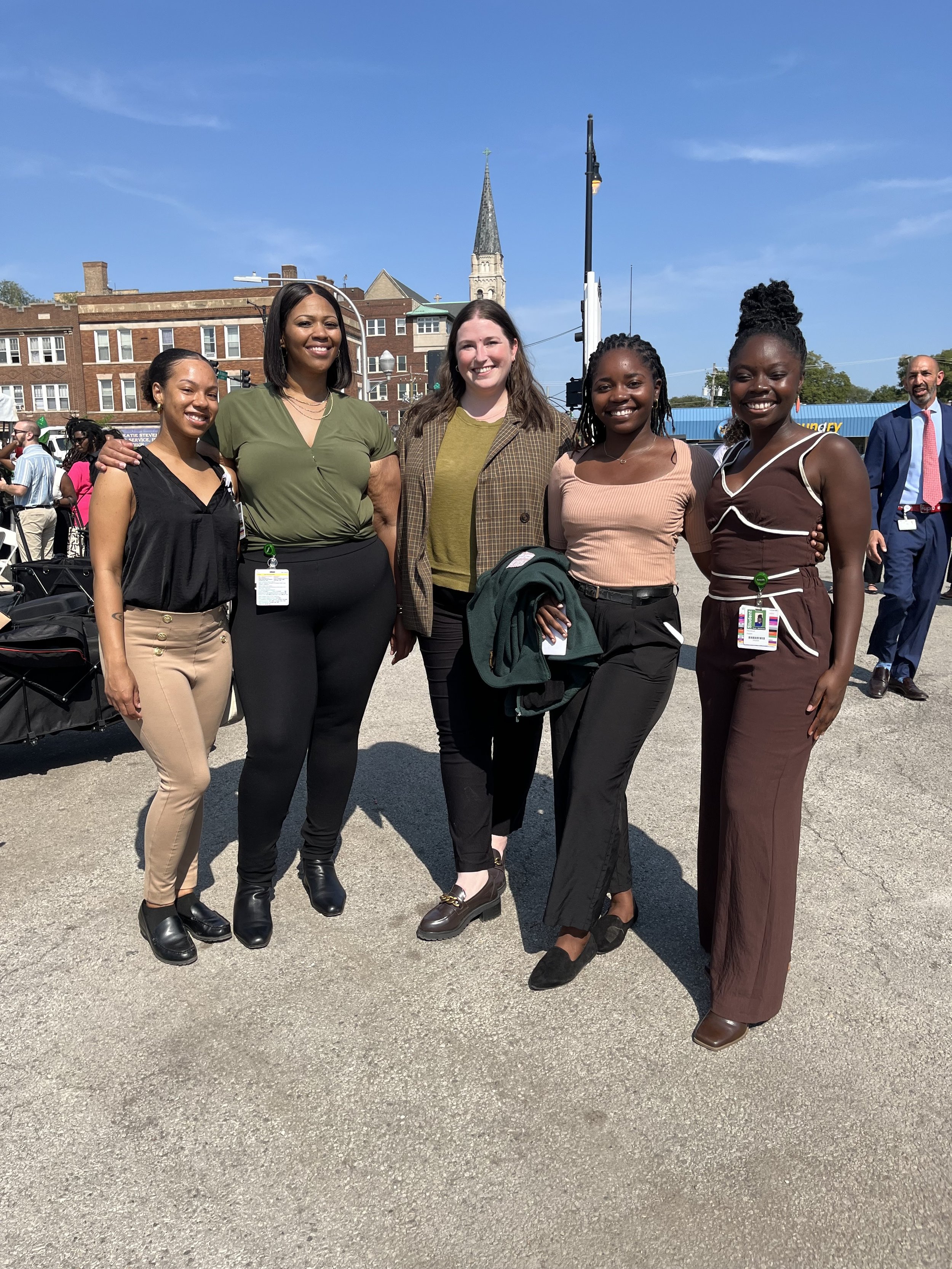RUSH’s Legacy Mental Health Fellowship: Empowering Future Mental Health Leaders
Legacy Mental Health Fellows with program staff.
From left to right: Nia Lennan, Kenisha Green, Rebecca Lahey (director), Jada Johnson, Perpetual Assem (program coordinator)
Program Goals
We know that individuals are more comfortable when they are served in and by their community. While there is a need for greater diversity in the mental health workforce, few pathways exist for emerging clinicians of color to become mental health providers. Additionally, communities with the greatest need often lack access to crucial mental health resources.
Recognizing this, the Legacy Mental Health Fellowship supports community wellness on Chicago’s West Side by empowering emerging clinicians of color to provide culturally attuned mental health services. Born out of a collaboration between RUSH University Medical Center Social Work and Community Health department, Chicago State University’s MSW program, and the Garfield Park Rite to Wellness Collaborative and generously funded by Rachel Kohler and Mark Hoplamazian, the ITW Foundation, and the Hemmelstein Endowment for Health Equity, the fellowship is grounded in four main pillars:
Capacity building: improving access to needed mental health services
Community partnerships: fostering trust and breaking down barriers
Workforce evolution: increasing the number of therapists of color in the field
Professional development: providing emerging MSW clinicians of color with training and practice opportunities.
Additionally, the Legacy Mental Health Fellowship enhances service access and community well-being by partnering with three community sites – RUSH@Home, the Institute for Non-Violence Chicago, and the MAAFA Redemption Project. Upon completing the two-year fellowship, fellows are eligible to take their LCSW exam and are encouraged to continue serving residents on Chicago’s West Side for an additional two years.
Program Overview
The fellowship represents an effort to reduce health disparities by addressing mental health treatment access through workforce diversification, training, and development. Fellows begin with a robust orientation before diving into various tasks, including:
Shadowing social workers in many different spaces across the hospital system
Individualized, intensive cognitive behavioral therapy training
Attending weekly supervision with Zinal Agnihotri, Program Manager for Integrated Mental Health and monthly supervision with Rebecca Lahey, Director of the Integrated Mental Health and Wellness program
Providing clinical services to patients in the RUSH Psychotherapy Clinic and at their designated partner site
Engaging in ongoing supervision and additional trainings at their designated partner site
Attending small group tutoring for the LCSW exam facilitated by an NASW exam prep tutor
Monthly training and case consultation with Dr. Karen Taylor-Crawford, a child and adolescent psychiatrist and expert in providing high-quality mental health care for Black and African American children, parents, families, and community, lifelong advocate for increased mental health access
"The fellowship is designed to be comprehensive and rigorous, offering extensive training in many evidence-based practices. We encourage fellows to utilize and explore different modalities to best fit the needs of their patients,” says Zinal. “Our goal is to ensure that fellows are not only well-prepared to meet the needs of their patients but also to become leaders in the field of mental health."
A Fellow's Journey
““This fellowship has been transformative for me. It’s been an invaluable step in my journey to becoming a leader in mental health.””
Kenisha Green, a current fellow, highlighted her path to the fellowship and the profound impact it has had on her career. Her desire to become a clinician stems from the disparities she’s faced in her own personal healing journey as an African American woman. The fellowship required her to leave her state job, a significant decision driven by her commitment to advancing her career in mental health and encouragement from mentors in the field, and passion for healing past trauma and empowering individuals to go from surviving to thriving.
Kenisha’s experience over the last year in the fellowship has been transformative. She describes a typical week split between providing therapy through the RUSH@Home program and the RUSH Psychotherapy Clinic, trainings, and supervision. "The hands-on experience, combined with the extensive training and supportive supervision, has significantly enhanced my clinical skills and confidence,” says Kenisha.
Impact and Future Aspirations
After completing the program, Kenisha's long-term goal is to establish a private practice that fosters a movement of Black mental health professionals providing culturally attuned services – something that she feels the fellowship is preparing her well for. "This fellowship has been transformative for me, “says Kenisha. “It's been an invaluable step in my journey to becoming a leader in mental health." She is also looking forward to offering services, such as workshops and support groups, through her practice to reduce the stigma associated with mental health.
The Legacy Mental Health Fellowship at RUSH University Medical Center is more than just a training program; it’s an empowering experience that equips future mental health providers with the skills, knowledge, and confidence to make a lasting impact. By addressing the critical need for culturally attuned mental health services on Chicago’s West Side, the fellowship is helping to create a more diverse and effective mental health care system.
Legacy Mental Health Fellows with funder.
From left to right: Innocent Orokoh, Jada Johnson, Rachel Kohler (funder), Maleek Ratliff, and Kenisha Green
Innocent Orokoh, Legacy Mental Health Fellow, with colleagues from the MAAFA Redemption Project



